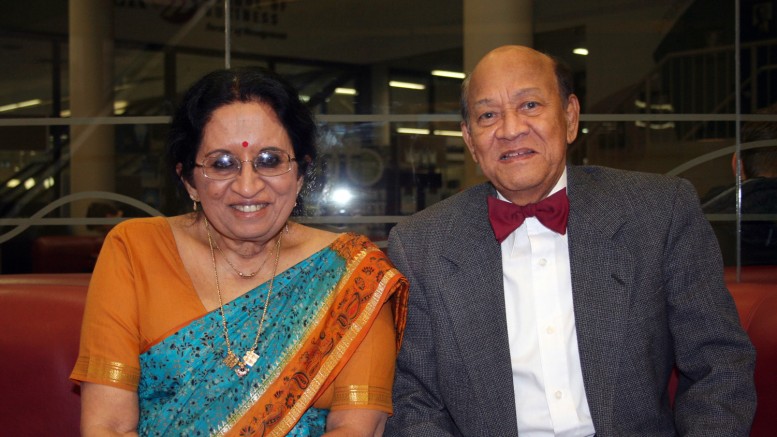The University of Manitoba has established a new Mahatma Gandhi scholarship for graduate students studying human rights. The scholarship, along with the forthcoming development of a master of human rights program at the university, helps to solidify Winnipeg as one of the leaders of human rights study in the country.
The scholarship was established thanks to a $100,000 donation from Krishnamurti Dakshinamurti and his wife Ganga Dakshinamurti.
Krishnamurti is a senior adviser at the St-Boniface Hospital Research Centre, professor emeritus at the college of medicine at the U of M, and the president of the Mahatma Gandhi Centre of Canada. Ganga is the reference librarian at the Albert D. Cohen Management Library and the winner of the Queen Elizabeth II Diamond Jubilee Medal in 2012.
The Mahatma Gandhi scholarship was inspired in part by Krishnamurti having met Gandhi in the 1940s during Gandhi’s fight for Indian independence from the British Empire.
According to Krishnamurti, this encounter shaped his view of the world and helped to crystallize his belief that any global progress that is sustainable has to involve processes of justice and reconciliation.
“The world has to recognize that the only way to a durable solution to our problems involves education,” he said.
“Education is the key to everything, at various levels. We felt that what would contribute toward the education of the next generation is very important for us to do.”
The idea behind the scholarship is that it is open to students in many disciplines, inviting students to look at the human rights issues in various fields in order to find solutions.
“What I think is good about this kind of program is that it could be at a broad level or it could be a specific human rights issue,” said Ganga.
“It’s not restricted; it’s as open and as specific as the recipient chooses to make it.”
The couple hopes that the scholarship program they have established will lead to sustainable, long-term solutions for global injustices and breaches of human rights through education, which they believe to be critically important for conflict resolution.
“Only if you understand the problem and its various facets will you be able to come up with a solution. In any situation where there are conflicts, there has to be an understanding, there has to be a basis of justice, and based on this there has to be reconciliation […] We feel that education is the basis of all such acts,” Krishnamurti said.
“The future lies with students, in a broad sense.”
While the scholarship program is a promising beginning, the awareness for human rights research needs to continue to gain traction, according to Krishnamurti. The Canadian Museum for Human Rights, for example, provides the public an opportunity to look at artifacts of human wrongs – but the educational process should not stop there.
“I think, ultimately, a scholarship program is a start. We hope that we will be able to add to it so that we give an opportunity for people to learn and grow, to get education and use the education in proper ways,” he said.
The scholarship is being officially announced on Nov. 5 at the Canadian Museum of Human Rights.
Jodi Giesbrecht, manager of research and curation at the museum, hopes the scholarship will bring human rights research – a relatively new area of study – into the spotlight.
“I hope that it really raises awareness about human rights research, that it brings different communities together, that it shows the ways in which human rights research can have really important effects on the broader community and public policy, and the way we can incorporate human rights research into so many different spheres of our lives,” she said.
“I think [the scholarship] will promote the study of human rights by showing the many different ways we can apply human rights knowledge, showing the ways in which human rights can cut across different disciplines and interests, and create a shared community of scholars. From that, the knowledge and research will only continue to grow.”



